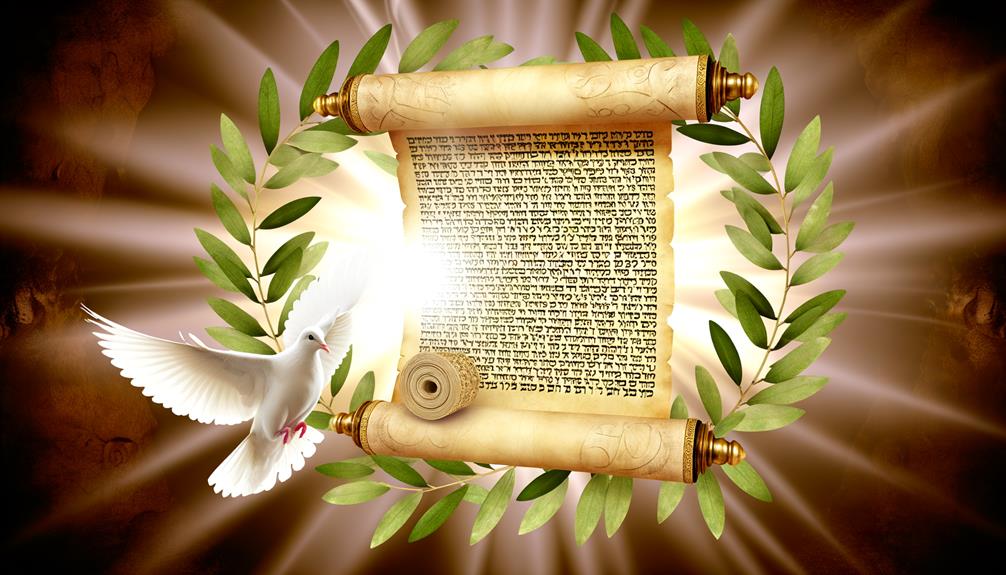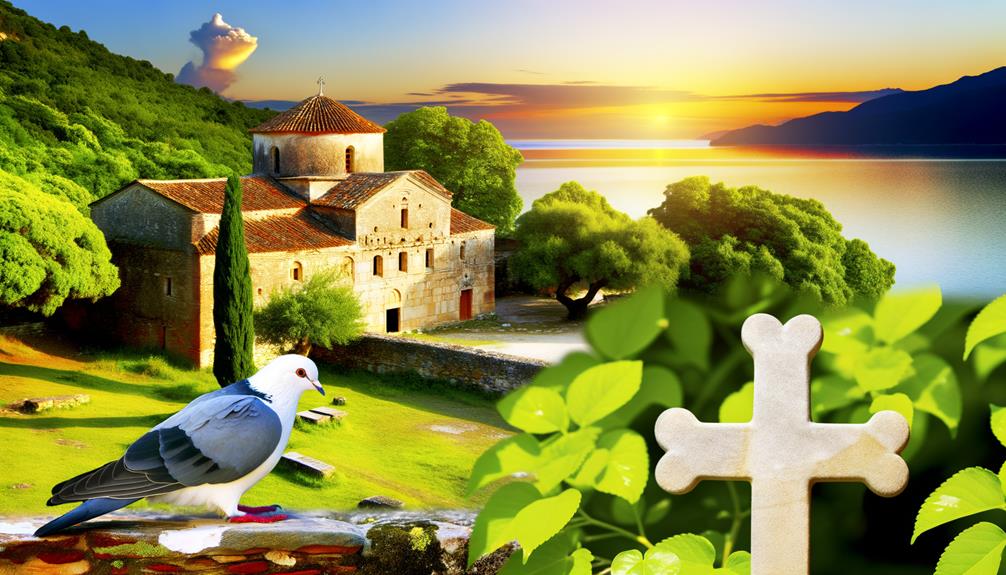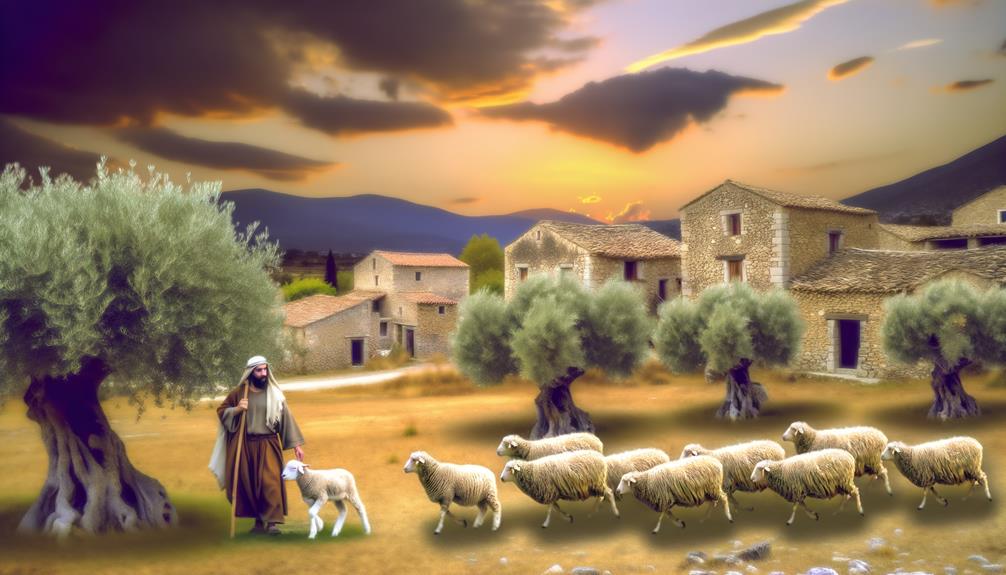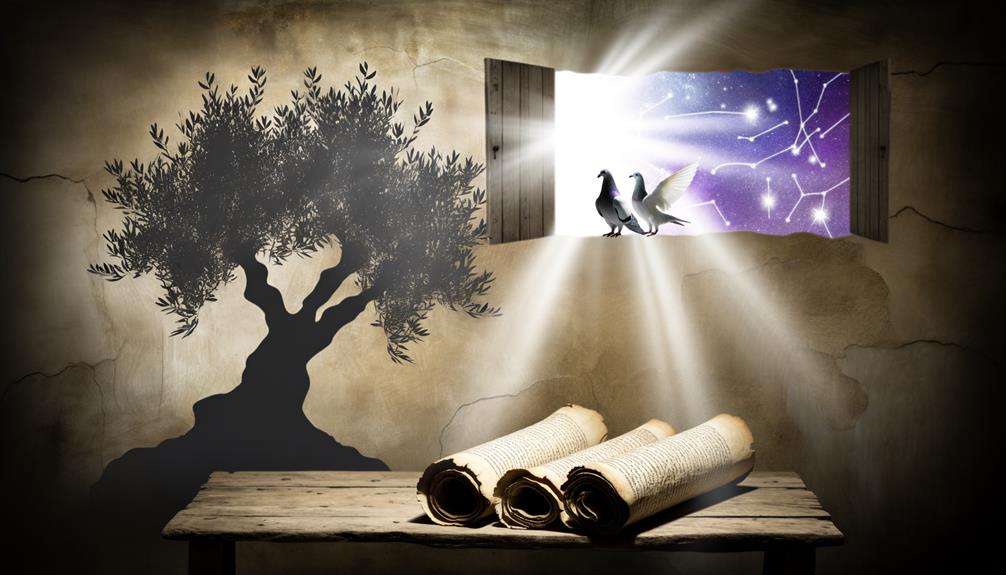Meaning of Callum in the Bible: Biblical Insight
The name Callum, derived from the Latin ‘Columba’, meaning ‘dove’, holds significant biblical connotations symbolizing peace, purity, and the Holy Spirit. It echoes the peaceful and restorative imagery of the dove in key biblical events, such as Noah’s Ark and Jesus’ baptism.
Linked to St. Columba, a pivotal figure in early Christianity, Callum blends cultural and religious narratives found in Celtic traditions and early Christian history.
Exploring this name reveals the profound interplay between linguistic evolution and Judeo-Christian symbolism, offering deeper insights into its historical and spiritual significance. Further exploration into its roots discloses more about these connections.

Biblical Meaning of the Name Callum: Peace and Spiritual Significance
| Aspect | Details |
|---|---|
| Name | Callum |
| Biblical Origin | Not directly mentioned in the Bible |
| Root Meaning | From Latin Columba, meaning “dove” |
| Spiritual Symbolism | Peace, purity, Holy Spirit |
| Possible Interpretation | One who brings peace or is guided by divine presence |
| Modern Biblical Insight | Associated with the dove as a symbol of the Holy Spirit in Christianity |
Etymology of Callum

The etymology of the name Callum originates from the Latin name ‘Columba,’ meaning ‘dove,’ which symbolizes peace and purity in various cultural and religious contexts.
This association with the dove is profound, as the bird is frequently depicted as a messenger of divine will and a representation of the Holy Spirit in Christian iconography.
The name’s evolution from Latin to Gaelic showcases linguistic shifts that underscore the blending of cultural narratives.
Contextually, the dove as a symbol permeates both scriptural references and broader historical texts, linking the name Callum to themes of tranquility and sanctity.
This etymological foundation enriches our understanding of the name’s biblical resonance, accentuating its metaphorical significance within theological frameworks.
Callum and Columba

The names Callum and Columba share etymological roots in the Latin word ‘columba,’ meaning ‘dove,’ which carries significant symbolic weight in Christian iconography.
Examining the historical and cultural contexts illuminates how these names evolved, particularly through the influence of St. Columba, a key figure in early Christianity.
This comparison highlights the enduring legacy of these names and their intertwined historical significance within religious traditions.
Name Origin Context
Rooted in ancient linguistic traditions, the name Callum derives from the Latin term ‘Columba,’ meaning ‘dove,’ a symbol historically associated with peace and the Holy Spirit in Christian theology. This etymological connection underscores the name’s deep spiritual significance.
The Latin ‘Columba’ evolved through Old Irish and Scottish Gaelic, emerging as Callum. The dove, a recurrent motif in biblical texts, is emblematic of purity, divine presence, and reconciliation.
Understanding Callum’s origin requires acknowledging the cultural and religious contexts that shaped its development. The name encapsulates a legacy of tranquility and divine favor, reflecting the profound impact of Judeo-Christian symbolism on language and personal identity.
This foundational perspective is essential for comprehending the broader biblical implications of the name Callum.
Historical Significance Link
Drawing from historical records, it is evident that the name Callum is intrinsically linked to Saint Columba, a seminal figure in early Christian history who played a pivotal role in the spread of Christianity throughout Scotland and beyond.
Born in Ireland in 521 AD, Columba founded the influential monastic community on the Isle of Iona in 563 AD. This monastery became a center for learning and religious conversion, considerably impacting the Pictish and Scottish peoples.
The name Callum, derived from the Latin ‘Columba,’ meaning ‘dove,’ symbolizes peace and the Holy Spirit. This association underscores the profound spiritual and cultural legacy left by Saint Columba, whose evangelistic missions and scholarly contributions are commemorated in the continuation of his name.
Cultural Influence Comparison
Examining the cultural impact of the names Callum and Columba reveals a nuanced interplay between linguistic evolution and enduring historical reverence.
Callum, derived from Latin ‘Columba’, signifies ‘dove’, a symbol of peace and the Holy Spirit in Christian theology. The name Columba is historically significant due to St. Columba, an influential 6th-century missionary who spread Christianity in Scotland.
Callum, consequently, inherits both spiritual and cultural gravitas. While Columba’s legacy is deeply rooted in ecclesiastical history, Callum’s contemporary usage bridges ancient reverence with modern identity.
The transformation from Columba to Callum, particularly in Gaelic-speaking regions, underscores the adaptability of language and its persistent homage to foundational religious figures, reflecting their lasting cultural resonance.
Symbolism of the Dove

In biblical texts, the dove frequently symbolizes peace, purity, and the Holy Spirit, serving as a potent emblem of divine presence and spiritual renewal.
This bird’s symbolism is richly layered; its gentle nature and serene flight are often associated with divine tranquility and innocence.
Contextually, the dove’s role in Noah’s story, where it returns with an olive branch, signifies the end of divine wrath and the restoration of harmony between God and humanity.
Additionally, the dove’s appearance at Jesus’ baptism epitomizes the Holy Spirit’s descent, marking a moment of divine endorsement and new beginnings.
This multifaceted symbol, consequently, encapsulates themes of forgiveness, spiritual awakening, and the intrinsic connection between the divine and the human soul.
Dove in Christian Scriptures

The presence of the dove in Christian scriptures is profoundly significant, as it is intricately woven into key theological narratives and doctrinal teachings. The dove symbolizes the Holy Spirit, as seen during Jesus’ baptism (Matthew 3:16).
It represents purity and peace, aligning with Noah’s dove in Genesis, which signaled the end of God’s judgment through the flood. Additionally, the dove embodies the gentleness and reassurance of God’s presence.
| Scripture Reference | Event | Symbolic Meaning |
|---|---|---|
| Matthew 3:16 | Jesus’ Baptism | Holy Spirit |
| Genesis 8:11 | Noah’s Ark | Peace and New Beginning |
| Luke 3:22 | Jesus’ Baptism | Divine Approval |
| John 1:32 | Baptism of Jesus | Holy Spirit Descent |
| Psalm 55:6 | David’s Lament | Desire for Peace |
This table illustrates the multifaceted roles of the dove in Christian theology.
Cultural Significance of Callum

Callum, a name of Gaelic origin, holds considerable cultural significance that extends beyond its etymological roots, intertwining with various historical, social, and religious narratives.
Largely found in Scotland and Ireland, the name is derived from ‘Columba,’ meaning ‘dove,’ a symbol of peace and purity.
Historically, Callum has been associated with figures like St. Columba, an influential Christian missionary credited with spreading Christianity in Scotland.
Socially, the name Callum resonates within Celtic traditions, where it often reflects cultural identity and heritage.
In addition, the evocative imagery of the dove has lent Callum a sense of spiritual tranquility, making it a favored choice among parents seeking to imbue their child’s name with deep, multifaceted meaning.
Biblical Themes and Callum

Exploring biblical themes, the name Callum, derived from ‘Columba,’ aligns with profound Christian symbols and narratives, most notably the dove, which represents the Holy Spirit, peace, and divine presence.
In Scripture, the dove appears during key events, such as Jesus’ baptism, symbolizing divine approval and the Holy Spirit’s descent. This imagery underscores Callum’s association with tranquility and spiritual purity.
Furthermore, the dove’s role in the story of Noah’s Ark, bringing an olive branch to signify the end of the flood, further imbues the name with themes of hope and renewal.
Consequently, Callum embodies a rich tapestry of biblical meanings, resonating deeply with Christian ideals of peace, divine guidance, and new beginnings.
Names With Similar Meanings

Building on the rich biblical symbolism associated with Callum, it is insightful to examine other names that carry similar meanings of peace, spiritual purity, and divine presence within Christian tradition.
Names such as Solomon, derived from the Hebrew word for peace, encapsulate the tranquility and wisdom bestowed upon the biblical king.
Another name, Samuel, signifies ‘God has heard,’ reflecting divine communication and purity.
Additionally, the name Gabriel, meaning ‘God is my strength,’ embodies the divine presence through the archangel who serves as a messenger of God.
These names, like Callum, underscore profound spiritual themes, offering a glimpse into the enduring values and virtues revered in biblical narratives.
Through their meanings, they contribute to a richer understanding of biblical heritage.
Callum in Religious Contexts

In religious contexts, the name Callum is often examined for its connections to themes of peace and purity, resonating with Christian ideals and biblical teachings. Derived from the Latin “Columba,” meaning “dove,” Callum symbolizes the Holy Spirit, frequently depicted as a dove in Christian iconography. This association emphasizes serenity and divine presence. The following table highlights key aspects:
| Aspect | Symbolism | Biblical Reference |
|---|---|---|
| Name Origin | Dove | Matthew 3:16 |
| Peace | Harmony with God | John 14:27 |
| Purity | Sinlessness | Matthew 5:8 |
Modern Interpretations

Modern interpretations of the name Callum often explore its evolving cultural significance, reflecting broader societal shifts and contemporary values.
While historically rooted in religious contexts, today’s understanding of Callum transcends its biblical connotations, resonating with themes of peace, multiculturalism, and modern identity.
The name, derived from the Latin ‘Columba’ meaning ‘dove’, now symbolizes tranquility and global harmony, aligning with today’s emphasis on inclusivity and unity.
Additionally, Callum’s popularity in various cultures signifies a blending of traditions, illustrating how names can bridge historical and modern contexts.
This evolution mirrors a growing desire to find relevance in ancient names, adapting them to contemporary narratives while preserving their timeless essence, thereby enriching the cultural tapestry.
Conclusion
The name Callum, derived from the Latin word for dove, is replete with symbolic and cultural significance.
Rooted in Christian iconography, the dove represents peace, purity, and the Holy Spirit. These attributes resonate deeply within biblical themes and texts, underscoring Callum’s spiritual connotations.
Understanding Callum in religious contexts highlights its enduring relevance.
Names with similar meanings further enrich the tapestry of cultural and spiritual interpretations, weaving a narrative that stands the test of time.






